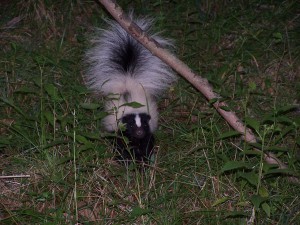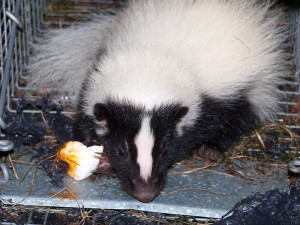Skunks can be a common pest problem, particularly in or near fields, forests, streams, suburbs, or swampy areas. Getting rid of skunks properly and humanely requires having a little basic background knowledge about the animal and its habits. Read on for some tips on how to get rid of skunks around your home and stay rid of them.
Skunks are typically nocturnal. They will find a place to use as a den during the winter months. Underneath your deck, porch, or shed makes a great winter home for a skunk. During its winter stay at your residence, a skunk will venture out on balmier nights in search of food and a mate. During the skunk mating season, which runs from February through most of March, they tend to be quite aggressive and will fight other skunks as well as spray that all-too-familiar stench both as a defense mechanism and during breeding. The litter is born about two months after breeding. A typical litter consists on average of four to six kittens. So, the best time to catch and remove any skunk that may have inhabited your property is before breeding season is over to avoid just one pesky skunk turning into a large family of pesky skunks.
Skunks are pretty brave in that they are generally not very afraid of humans or your pets. They can spray targets as far as 15 feet away and can hit things at a 90 degree angle at that. Skunks often carry rabies and canine distemper, so it is very important to keep them away from your children, your pets, and yourself. Their senses of touch and smell are very keen. Their weaknesses lie in their lack of climbing ability, poor hearing, and poor vision.
How to get rid of skunks safely and humanely once they have arrived simply involves a good trap and some effective preventative measures. It is a good idea to sprinkle flour or powder around the skunk’s den during the day. This way you will know when it has left to find food and can safely and optimally begin your siege. A professional nuisance wildlife control trapper will use strategically placed durable and secure traps that will effectively ensnare the animal without harming it and prevent it from being able to raise its tail for spraying purposes once inside. Once the skunk is caught, we will remove it from your property.
Skunks will dig their own dens if necessary, but they will more often take up residence in a space that is already available to them. Meaning that if you have had a skunk before, a new one will move into the old one’s dwelling if it finds it. Obstruct access to such areas to avert new arrivals from staying. As unadulterated omnivores, they will eat practically anything. Bird feeders, compost piles, exposed garbage, and large amounts of insects may draw skunks onto your property. Eliminate such feeding opportunities to help avoid luring them into your area.



